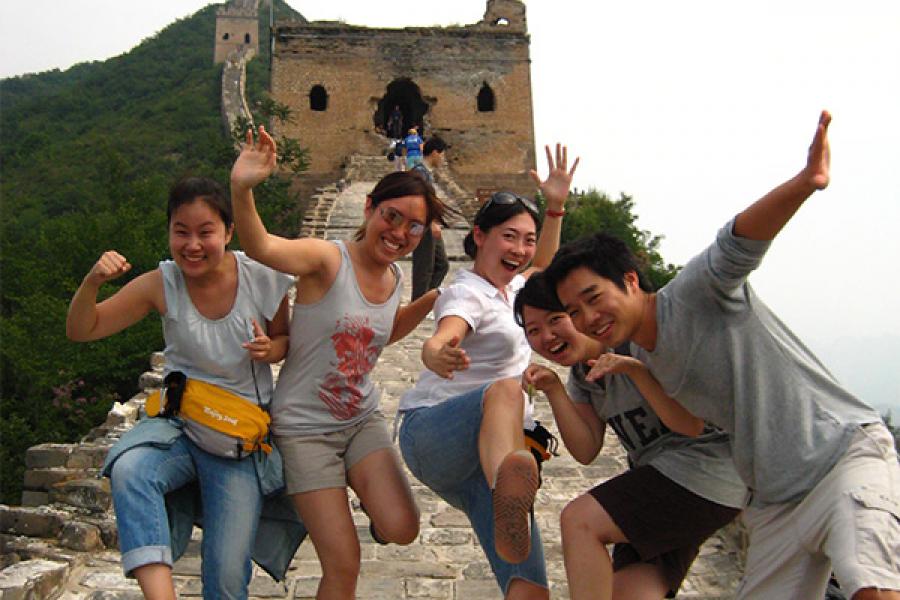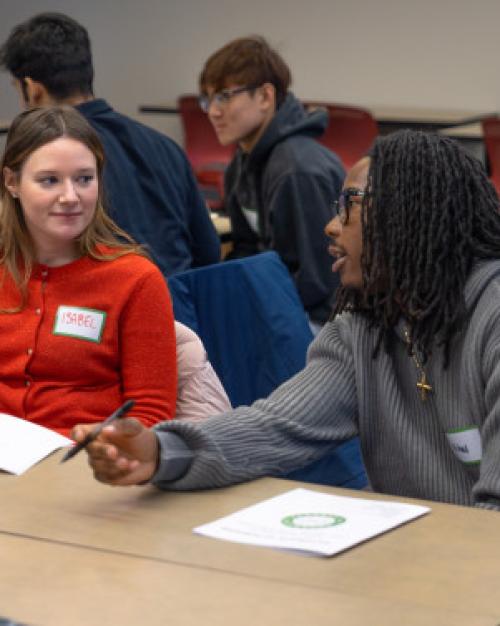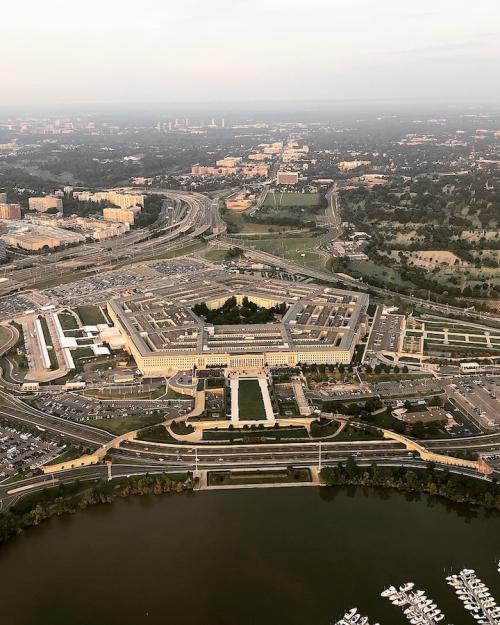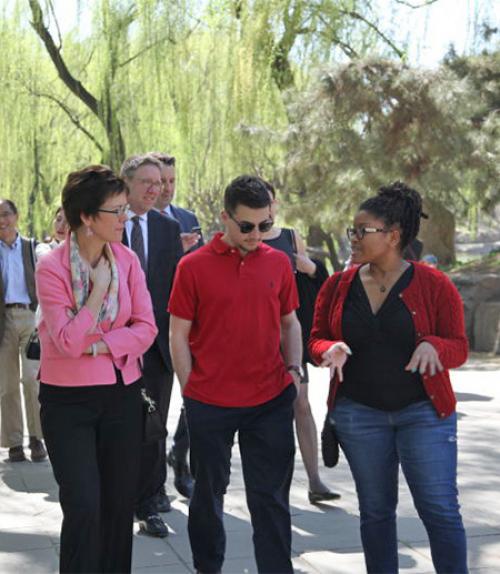In 1972, Nixon withdrew 70,000 troops from Vietnam -- but people on both sides were still dying. To Cornell engineering undergrad Michael Zak '75, the war was an “oozing wound” in the nation’s side. Worst of all, he realized that this long, painful war had been fought essentially over a set of misunderstandings, arising from a misinterpretation of China’s relationship with Vietnam.
Zak knew something needed to change. “As a nation the U.S. needed to make a fundamental commitment to understand China better and so did I.”
Fast-forward 27 years. Post-9/11, it was clear to Zak that the U.S. still didn’t understand China. Zak proposed to then-Cornell President Hunter Rawlings that Cornell leverage its tradition of excellence in East Asian and China studies to help build a new generation of China experts.
And the China & Asia-Pacific Studies (CAPS) Program was born.
10 Years of CAPS
On April 1, the 10th anniversary of CAPS was observed in China with a visit to Beijing by Gretchen Ritter, Harold Tanner Dean of Arts & Sciences, Laura Spitz, Vice Provost for International Affairs and Frederick Van Sickle, Vice President for Alumni Affairs and Development. Their visit included meetings with top-level administrators of Peking University and the School of International Studies. They also met informally with the five CAPS majors currently studying in Beijing.
“CAPS is a model partnership of Cornell’s academic expansion around the world,” said Ritter in her remarks. “I am deeply invested in the success of CAPS.”
This past September, alumni, faculty and students celebrated the tenth anniversary at Cornell in a day-long conference entitled “The Past, Present & Future of China & Asia-Pacific Studies at Cornell University.”
“CAPS began as a vision of Michael Zak ,” said CAPS director Andrew Mertha, professor of government, in his opening remarks. “He issued a wake-up call: that the study of the relations between China, the United States, and the Asia-Pacific was too important to leave to amateurs.”
CAPS is the first four-year undergraduate major with a focus on China in any leading university in the U.S., according to Haiyan Wang, CAPS assistant director.
“It took a lot of work to get it under way, most of it done by Professor Sherman Cochran,” recalled Zak, who noted that the faculty senate approved the new major by a unanimous vote, an unusual occurrence. Cochran, the Hu Shih Professor of Chinese History, developed Zak’s idea into a curriculum (and later served as a director of CAPS). Chen Jian, one of the world's leading China experts, was recruited as CAPS’ first director, and appointed as the Michael J. Zak Professor of History for U.S.-China Relations.
Why China?
“Sino-U.S. relations are by far the most important bilateral relationship in the world,” says Mertha. “CAPS is designed to train the next generation of young China hands who appreciate the complexities involved. They gain, first-hand, hard experience combined with linguistic skills and professional experience on the ground. They graduate with a skill set that they can immediately apply.”
“The issues that face us today and their global ramifications -- like climate change, cybersecurity, and economic development – tell us it is crucial to understand China and China’s relationship to the world for our own sake as well as for the sake of the world,” said Gretchen Ritter, the Harold Tanner Dean of Arts & Sciences, at the anniversary event.
The number of China scholars in the government department has doubled since the CAPS program began. This year, two additional “world class” experts were added, notes Mertha: Jessica Chen Weiss and Jeremy Wallace, both associate professors of government. “Their appointments help make Cornell the epicenter in the study of Chinese politics in the United States at both the undergraduate and graduate levels,” says Mertha. “CAPS has allowed us to have the most robust Chinese politics in the government department in the country, with the largest number of faculty specializing in China of any American political science department.”
Associate Professors Jeremy Wallace and Jessica Chen Weiss
“It’s exciting to be part of something that’s growing, that’s increasingly important,” says Wallace.
Another of Cornell’s renowned China experts, Allen Carlson, associate professor of government, will begin his appointment as director of CAPS in July, when Mertha steps down.
Students in CAPS see their education mattering on the large scale. As Cole Devoy ’17 notes, “An engaged, really well-studied group of China scholars…is crucial to making sure the U.S. China relationship is not only strong but peaceful in the 21st century.”
And while there’s always been a policy orientation to CAPS, people interested in fields like art, history and anthropology are also important to the program, says Mertha. “Their voices are key in public discourse about China.”
Learning by Doing, In China
One of the unique qualities of the CAPS program is that it requires a semester of study and an internship in Beijing. This is not the case in many other China programs.
“The most valuable aspect of the CAPS program is living there,” says Charles Austin Jordan ’16. “I especially valued the travel…we went all over China, just seeing so many different aspects of Chinese culture and Chinese life. That’s been really eye-opening for me .”
Wallace points out that “CAPS pushes students to go and interact with China in a real way; students are being forced to encounter China in place and learn with much better context and contrast. If you don’t go into depth you don’t really understand its nuances. CAPS structures that deep dive in an important way .”
Wallace, whose first book was on urbanization in China, notes that it’s particularly important for students studying in a small town like Ithaca to encounter big cities in China and to understand the urban/rural divide.
High-quality language instruction is at the core of the CAPS program, taught by instructors in the Asian studies department and CAPS language instructors in Beijing and in Washington D.C. “They’re outstanding,” says Mertha. Students graduate at a 4000 or higher level in Chinese, a proficiency level that enables them to use the language in their work and daily life when in China.
Networking in Washington, D.C.
CAPS majors are encouraged to spend an additional semester off-campus, in Washington, D.C. Students in the recently-launched CAPS minor (one of a handful of cross-campus minors open to all undergraduates) can also spend a semester in D.C., China, or both.
The semester in Washington, D.C., is an immersion program for U.S. Chinese policy, with students able to interact directly with people engaged in the policy community. Many students use these encounters as an opportunity to begin building their own personal networks among the China experts they meet through the program. And since they are in D.C. for a whole semester, they can follow up this initial contact with personal visits.
“A big part of CAPS is the community and networks. Students live and work and study together in Beijing and D.C., and these relationships continue into their professional careers,” says Mertha.
That sentiment is echoed by CAPS alum Kevin Lee ’12, now at the Cornell Law School. “Some of my best friends today are from CAPS,” he says. “We became a very tight-knit family.”
The internships students do while in D.C. give them an inside view of how the U.S. government works, and because they have a well-rounded background in China, unexpected opportunities can emerge, as JinHan Kim ’16 recounts. He was interning at the White House’s Council of Economic Advisors when President Obama visited Beijing to attend the 2014 APEX summit. A senior staff member asked for Kim’s feedback because of his knowledge of China, and Kim was able to offer comments that went beyond economics to draw on insights from Chinese history, politics and society. “CAPS has trained me to look at a problem or a phenomenon from a very well-rounded perspective,” he says.
“Many people are interested in what China’s rise means, but few people are equipped to take advantage of what those opportunities mean,” says Weiss.
I am deeply invested in the success of CAPS, and as we reflect on the first ten years, we have begun reshaping it into a premier program that showcases the college's internationalization efforts and expands its reach and scope academically within Cornell and with its partner, Peking University.
A Program Re-energized
The tenth anniversary has seen a re-examination and revitalization of the CAPS curriculum. The premier program showcases the college's internationalization efforts and expands its reach and scope academically within Cornell and with its partner, Peking University.
While CAPS students have previously focused primarily on political science and history as disciplines of central study, a renewed commitment has been made to broader intellectual endeavors involving China, including art, culture, and business. In addition to political science and history, students will be able to choose tracks emphasizing Economics and Commerce, Science and Technology, Arts and the Humanities -- or create a custom track.
Students Majoring in CAPS
Students in CAPS come from a wide range of backgrounds. The program’s goal, says Mertha, is to educate students from across the Pacific as well as those born in the U.S., giving students a Chinese and Asian perspective in addition to that of their own country.
The program is kept deliberately small, with each class capped at 20. Often students double major w/economics, government, pre-med, and business. Mertha says that because of the internships and China study, “majors graduate with a perfect synergy of interests, skill sets and professional goals tightly packed together, directly related to what they want to do when they graduate. It’s exhilarating to see.”
Linyihui Xu '15 describes her decision to double major in CAPS and economics as the most profound turning point in her Cornell life. Despite being from Shanghai, she says “I barely know my motherland as the liberal arts education is not that solid in China.” She changed her career goal from finance to “caring” public affairs, noting that the CAPS program “has equipped me with pre-professional research skills, expanded my vision in every perspective and helps me see a larger picture of my life.”
After CAPS
Graduates of CAPS have gone on to myriad careers. Justin Orr ’08 spent three years in Beijing working as a risk consultant advising multinational clients on crisis management and risk exposure in China before going on to law school at UC Berkeley. Jonathon Ray ’09 is a research associate at Defense Group Inc. and has published on security topics, most recently on China's neutron bomb program. Max Rothkopf ’08 is an MBA student at Harvard Business School, after spending four years as an analyst and associate at a private equity firm in Beijing, then two years in Abu Dhabi as a member of the Asia Pacific real estate team at ADIA.
“China changes every day and we’re in the middle of it. We get to study this very dynamic relationship … and I think that’s what also really special about what we do and what we’re learning,” says Amanda Williams ’17.
Anna Hak yung Kook ’17 agrees. “This major is very relevant to the world around us. The U.S. China relationship is always changing and it will always be changing in the future, and we can play a factor in affecting that.”






